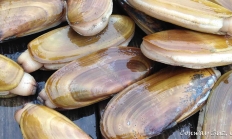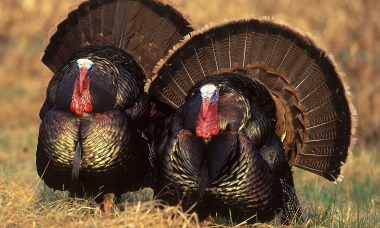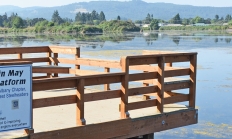
Search myodfw.com
Shooting accurately starts with the proper form, and that begins with a good stance. From your feet up through your hips and torso, a solid foundation in your lower body will improve your shooting. Start with an open stance The “open” stance is a good one for beginners. It’s easy to master and to practice consistently. An open stance positions yours hips and shoulders in-line with the direction you ’re shooting. This perpendicular setup to the target is simple to do. First, place one foot on each side of the shooting line. Most ranges will have these lines. If not

The southwest zone includes Umpqua River, Coos Bay, Coquille River, Port Orford, Rogue River and Chetco River - all of which offer shellfishing.
Before shooting a bow, you’ll want to make sure it's safe to fire. Bow/arrow safety check list Check that the string and cable are in good condition and aren ’t rubbing or fraying at any point. Use bowstring wax regularly to keep your string in good condition and safe to shoot. Check that the cams, limbs and riser are all in good shape. Look for cracks, dents, breaks, delaminations, peeling fiberglass, and any mechanical parts that may be defective. If any part of the bow is suspect, don’t shoot it. Fix it or take it to an archery shop to

ODFW manages 20 wildlife areas across the state, each with a unique blend of fishing, hunting and wildlife viewing opportunities. Remember, you'll need a Wildlife Area Parking Permit for your visit. See the map and listing below to find the wildlife area nearest you.


ODFW manages 20 wildlife areas across the state, each with a unique blend of fishing, hunting and wildlife viewing opportunities. Remember, you'll need a Wildlife Area Parking Permit for your visit. See the map and listing below to find the wildlife area nearest you.

Turkeys make a lot of different sounds, many of which are different in spring and fall. Though most hunters can routinely fill tags by using only two or three sounds, it’s good to know what other sounds turkeys make and why. The hen yelp and variations The most commonly heard sound in the turkey woods is made by the hen, and it’s called a yelp. Toms also yelp, but it’s louder, raspier and often more drawn-out than that of hens. The yelp is usually delivered in a series of one-note tunes. However, yelps can take on various forms. Specifically, there

Commission meets June 12-13 in Pendleton
Adam Baylor, (503) 947-6012
Michelle Dennehy, (503) 931-2748
SALEM Ore. – The Fish and Wildlife Commission meets June 12-13 for a field tour on Thursday and a regular meeting Friday.
See the agenda here. The meeting will also be livestreamed from the Commission page.
To testify on an agenda item virtually, register on the agenda page at least 48 hours in advance (by Wednesday, June 12 at 8 a.m.). Instructions for registering to provided testimony and links for submitting written testimony are provided on the meeting agenda.
To testify during the public forum section about an issue that is not on the agenda, use the form on the agenda page, at least 48 hours in advance of the meeting. To submit comments, use the link provided with each agenda item (see "Submit written comments on this agenda item Here").
Thursday's tour begins at 8:15 a.m. at the building site for ODFW';s future Pendleton office, 1502 SW 37th St. Members of the public may join the tour but must provide their own transportation and lunch.
On Friday, the Commission meeting starts at 8 a.m. at The Vert Auditorium at Pendelton City Hall, 480 SW Dorion Ave.
At Friday's meeting, the Commission will be asked to approve:
2025 Coastal River Fall Chinook Regulations: Adopt fishing regulation changes for Oregon coastal Wild Fall Chinook. Forecasts for wild Chinook are similar to last year for most river basins. The most significant change proposed is for the Umpqua River; most of the mainstem would be closed to all salmon fishing under the proposal (bank angling for hatchery Chinook would be allowed from the tips of the jetties to Hwy 101). Last year's return of fall Chinook to the Umpqua was the lowest on record since 1980 and forecasts for the last four out of five years have overpredicted returns. For more information about coastal fall Chinook seasons, see the agenda item or the coastal fall salmon webpage.
Commercial coastal pelagic species: Adopt proposed rule amendments to ensure that state regulations are consistent with federally adopted limits and management measures for Pacific sardine. The federal regulations will maintain the primary directed fishery closure and continue to limit other harvest to very low levels to ensure that fishing mortality is not interfering with the stock's potential to rebuild when environmental conditions become favorable.
Preference Point Appeals: Review appeals of requests to reinstate preference points from several hunters that have been denied reinstatement by the department.
Auction and raffle tags: Allocate special hunting tags for auction and raffle in 2026. Host organizations receive 10 percent of the sales price for the tag sold at auction, which they can use to fund their own grant programs benefiting wildlife.
Oregon Conservation and Recreation Fund (OCRF) funding: Approve OCRF Advisory Committee's recommendations for wildlife passage project funding.
Recreation and Enhancement (R&E) Program: Approve the R&E Board funding recommendations for Cycle 25-1 Projects and the 2025-27 R&E Administration and Operations Budget. R&E funds help improve fisheries and access throughout the state.
The Commission will also hear a staff presentation and take public testimony on proposed rules to help protect Oregon's fish and wildlife from invasive species by adding to the prohibited list (so no import, sale, purchase, exchange or transport allowed) the following: golden mussels, non-native abalone, sea turtles Cheloniidae and Dermochelyidae, the entire family of Viviparidae mystery snails and Muricidae oyster drills. Public comment for this rulemaking closes June 20, and the Commission will be asked to approve the rule amendments at their Aug. 15, 2025 meeting. Submit comments via the rulemaking page.
The Commission will meet in executive session to consider information or records that are exempt by law from public inspection, and to consult with legal counsel concerning the legal rights and duties of a public body with regard to current litigation or litigation likely to be filed as authorized by ORS 192.660 (2)(f) and (2)(h). Members of the media can attend the Executive Session but may not report on anything heard during that session. Media wishing to attend should contact the Director's office at (503) 947-6044.
Reasonable accommodation, such as assistive hearing devices, sign language interpreters, and materials in large print or audiotape, will be provided as needed. To ensure availability, please contact the Director's Office at (503) 947-6044 at least 48 hours prior to the meeting to make your request. TTY users can reach ODFW by using the Oregon Telecommunications Relay Service. Please dial 711 and ask to connect to 503-947-6044.
###


Whether it's concerns about your local fishery, questions about an upcoming hunt, or comments about an agency policy, we want to hear from you. Please feel free to call or send us an e-mail.

Look here to find out how waterfowl counts this week compare to years past.
Look here to find out how waterfowl counts this week compare to years past.



